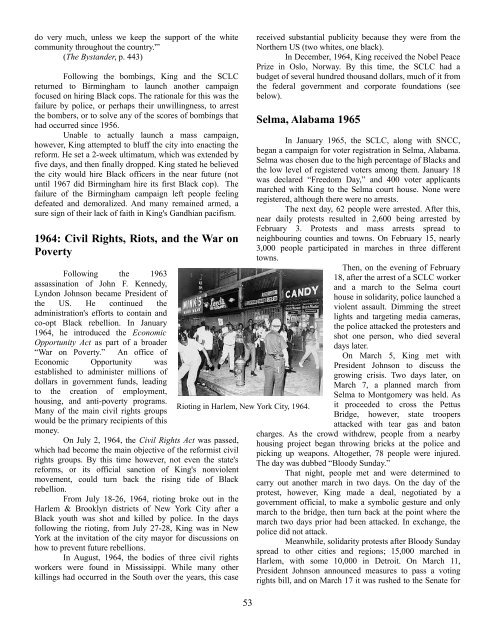smash-pacifism-zine
smash-pacifism-zine
smash-pacifism-zine
You also want an ePaper? Increase the reach of your titles
YUMPU automatically turns print PDFs into web optimized ePapers that Google loves.
do very much, unless we keep the support of the white<br />
community throughout the country.'”<br />
(The Bystander, p. 443)<br />
Following the bombings, King and the SCLC<br />
returned to Birmingham to launch another campaign<br />
focused on hiring Black cops. The rationale for this was the<br />
failure by police, or perhaps their unwillingness, to arrest<br />
the bombers, or to solve any of the scores of bombings that<br />
had occurred since 1956.<br />
Unable to actually launch a mass campaign,<br />
however, King attempted to bluff the city into enacting the<br />
reform. He set a 2-week ultimatum, which was extended by<br />
five days, and then finally dropped. King stated he believed<br />
the city would hire Black officers in the near future (not<br />
until 1967 did Birmingham hire its first Black cop). The<br />
failure of the Birmingham campaign left people feeling<br />
defeated and demoralized. And many remained armed, a<br />
sure sign of their lack of faith in King's Gandhian <strong>pacifism</strong>.<br />
1964: Civil Rights, Riots, and the War on<br />
Poverty<br />
Following the 1963<br />
assassination of John F. Kennedy,<br />
Lyndon Johnson became President of<br />
the US. He continued the<br />
administration's efforts to contain and<br />
co-opt Black rebellion. In January<br />
1964, he introduced the Economic<br />
Opportunity Act as part of a broader<br />
“War on Poverty.” An office of<br />
Economic Opportunity was<br />
established to administer millions of<br />
dollars in government funds, leading<br />
to the creation of employment,<br />
housing, and anti-poverty programs.<br />
Many of the main civil rights groups<br />
would be the primary recipients of this<br />
money.<br />
On July 2, 1964, the Civil Rights Act was passed,<br />
which had become the main objective of the reformist civil<br />
rights groups. By this time however, not even the state's<br />
reforms, or its official sanction of King's nonviolent<br />
movement, could turn back the rising tide of Black<br />
rebellion.<br />
From July 18-26, 1964, rioting broke out in the<br />
Harlem & Brooklyn districts of New York City after a<br />
Black youth was shot and killed by police. In the days<br />
following the rioting, from July 27-28, King was in New<br />
York at the invitation of the city mayor for discussions on<br />
how to prevent future rebellions.<br />
In August, 1964, the bodies of three civil rights<br />
workers were found in Mississippi. While many other<br />
killings had occurred in the South over the years, this case<br />
received substantial publicity because they were from the<br />
Northern US (two whites, one black).<br />
In December, 1964, King received the Nobel Peace<br />
Prize in Oslo, Norway. By this time, the SCLC had a<br />
budget of several hundred thousand dollars, much of it from<br />
the federal government and corporate foundations (see<br />
below).<br />
Selma, Alabama 1965<br />
Rioting in Harlem, New York City, 1964.<br />
53<br />
In January 1965, the SCLC, along with SNCC,<br />
began a campaign for voter registration in Selma, Alabama.<br />
Selma was chosen due to the high percentage of Blacks and<br />
the low level of registered voters among them. January 18<br />
was declared “Freedom Day,” and 400 voter applicants<br />
marched with King to the Selma court house. None were<br />
registered, although there were no arrests.<br />
The next day, 62 people were arrested. After this,<br />
near daily protests resulted in 2,600 being arrested by<br />
February 3. Protests and mass arrests spread to<br />
neighbouring counties and towns. On February 15, nearly<br />
3,000 people participated in marches in three different<br />
towns.<br />
Then, on the evening of February<br />
18, after the arrest of a SCLC worker<br />
and a march to the Selma court<br />
house in solidarity, police launched a<br />
violent assault. Dimming the street<br />
lights and targeting media cameras,<br />
the police attacked the protesters and<br />
shot one person, who died several<br />
days later.<br />
On March 5, King met with<br />
President Johnson to discuss the<br />
growing crisis. Two days later, on<br />
March 7, a planned march from<br />
Selma to Montgomery was held. As<br />
it proceeded to cross the Pettus<br />
Bridge, however, state troopers<br />
attacked with tear gas and baton<br />
charges. As the crowd withdrew, people from a nearby<br />
housing project began throwing bricks at the police and<br />
picking up weapons. Altogether, 78 people were injured.<br />
The day was dubbed “Bloody Sunday.”<br />
That night, people met and were determined to<br />
carry out another march in two days. On the day of the<br />
protest, however, King made a deal, negotiated by a<br />
government official, to make a symbolic gesture and only<br />
march to the bridge, then turn back at the point where the<br />
march two days prior had been attacked. In exchange, the<br />
police did not attack.<br />
Meanwhile, solidarity protests after Bloody Sunday<br />
spread to other cities and regions; 15,000 marched in<br />
Harlem, with some 10,000 in Detroit. On March 11,<br />
President Johnson announced measures to pass a voting<br />
rights bill, and on March 17 it was rushed to the Senate for



